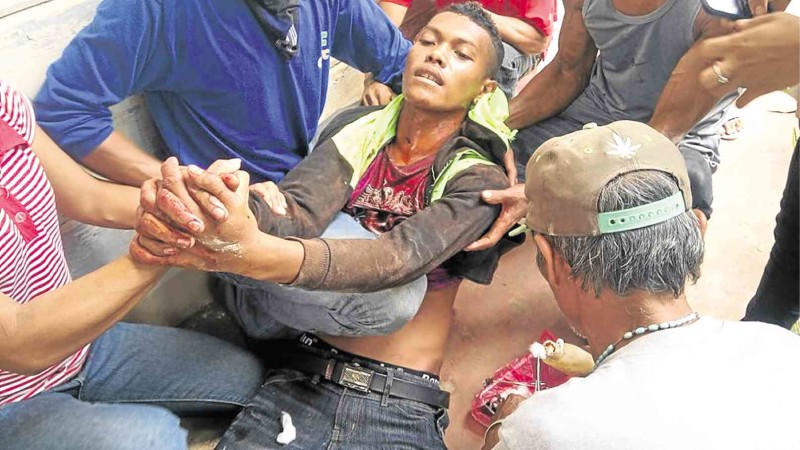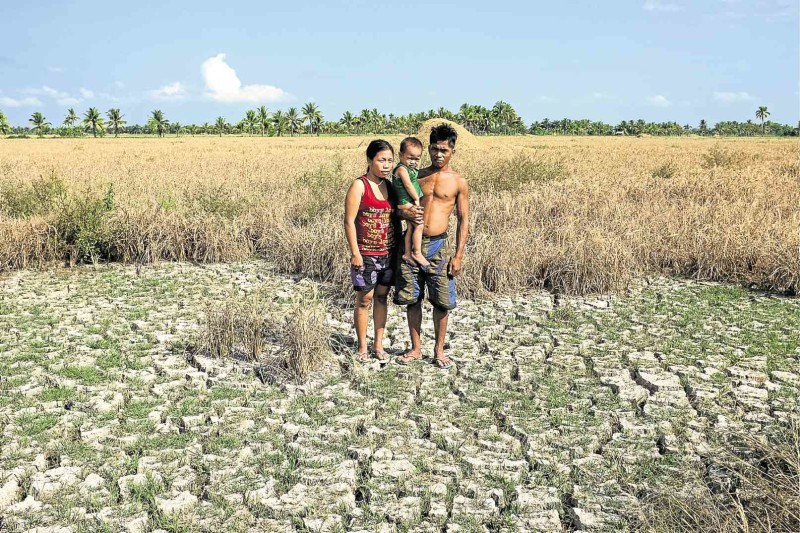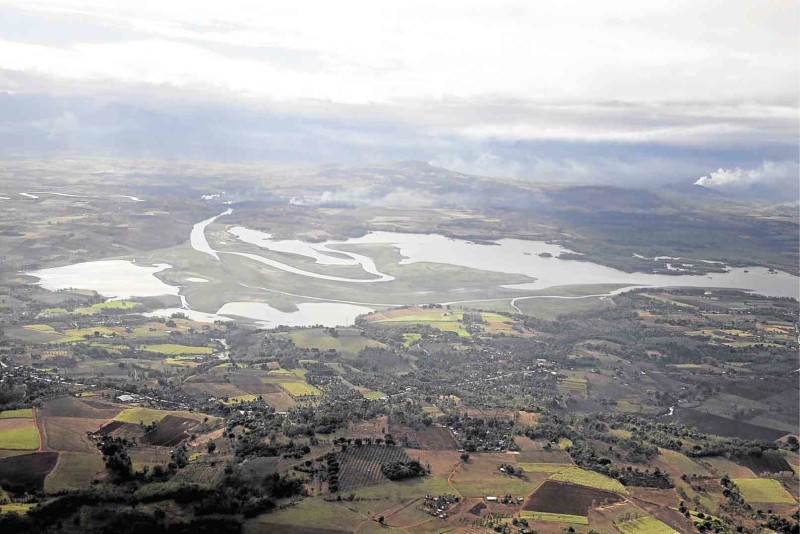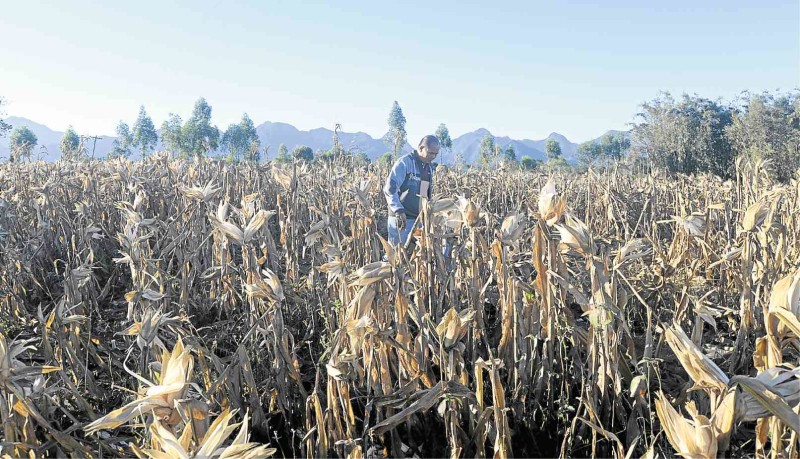Bloodshed in Kidapawan: Climate change, conflict, politics of famine

FIGHTING FOR DEAR LIFE A wounded protester holds on to dear life after police in Kidapawan City fired shots to disperse thousands of drought-stricken farmers blocking the national highway to demand rice from government. Three farmers died in the dispersal. KILUSANG MAGBUBUKID NG PILIPINAS
People prayed for rain these past few months in North Cotabato. Drought plagues the province like no other in Mindanao, laying waste to tens of thousands of hectares of rice farms planted in time for the March harvest season.
The harvest would have brought food on the table, relief from the heat and the chance to plant anew for the main season crop in September.
But the rains did not come and cloud seeding did little to alleviate the shortage of water. Rice stocks were adequate and the granaries were full. Yet, no relief came despite repeated pleas for help from indebted farmers, their burdened wives and their starving children.
When the rains finally came they took the form of bullets pouring hard on them.
Dress rehearsal
In 2015, a massive drought also hit many parts of Mindanao with severe crop losses. Rice farmers petitioned the government for aid and demanded the release of stocks to stop hunger from spreading.
Unknown to most of us, the areas hit by drought have a long history of food-stock raiding in times of crisis.
In 1990, farmers ran off with 500 sacks of rice from National Food Authority (NFA) warehouses in Roxas town, Arakan Valley. In 1993, farmers from drought-stricken communities took 3,000 sacks of rice from an NFA warehouse in Columbio, Sultan Kudarat.
In 1998, starving families from Matalam, North Cotabato were joined by Moro rebels who threatened to ransack government warehouses if their food needs were not addressed. The NFA promptly released rice.
These events would serve as a dress rehearsal for the Kidapawan tragedy. If one must learn lessons from the drought of 2016, it is that this crisis is only the most recent event in a long narrative of catastrophe, hunger and conflict in Mindanao.
Two narratives
There are two competing narratives used to explain the deadly events that left three people dead and scores wounded in Kidapawan.
The first narrative points to the legitimate protests of farmers demanding access to rice stocks to avert famine. In this narrative the farmers are the aggrieved party, their families reeling from hunger as government turned a deaf ear to their pleas and unleashed the full might of the state to quell the protest, leading to dire consequences.
The second narrative turns the spotlight on those who manipulate legitimate protest and use it to shame the government, no matter the cost in human lives.
In this narrative, the police and civilian bureaucracy are the victims. They tried their best to provide relief and clear the roads to facilitate travel, but failed to stifle the impatience and prevent the violence induced by the protesters. Their efforts were lost in the haze of denunciation and name-calling.
With no disrespect to the lives lost and the anguish and suffering on both sides of this conflict, it now seems relevant to ask: “Does it really matter which narrative counts?”
What stares us in the face is the truth that people who produce our food have little of their own. They are the face of poverty in a country vaunting its cash transfers to the poor while denying relief from hunger to its food producers.

A RICEFIELD of a family in M’lang, North Cotabato, has dried up due to drought. KARLOS MANLUPIG/INQUIRER MINDANAO
Acts of desperation
The roadblocks were acts of desperation by the poor, some of whom have taken their own lives. They were waging an uphill battle to capture public attention to their plight in the midst of the 2016 political circus.
Poor farmers also blocked the Davao-Agusan highway in Davao City for eight hours. Many people denounced the protesting farmers for the inconvenience. Yet, how many times have we endured similar roadblocks to suit the whims of government officials, churches and political campaigns? A well-known writer put it succinctly when he denounced the clear double standard: “So it was OK to shoot them?”
Beyond the division and recrimination that characterized the response of a divided nation, we must now reflect on the urgent and decisive actions that can be taken to prevent a repeat of this tragedy.
Climate change, famine
The tragedy bares the deadly effects of climate change on food production and the links between hunger and violent conflict. Climate change over the past few years has led to more intense droughts and flooding neither seen nor felt at any time in the past.
People expect the government to be prepared adequately by now. Yet, amid rising tensions the government’s response was to assure the public that rice and other food supplies were adequate. Two days after the bloodshed, the secretary of agriculture continued to mount this defense.
Indeed, government warehouses were filled with rice and foodstuff. Yet, anyone studying famine would have known that bulging food supplies do little to placate alarm. They actually invite agitation, as these signify the state’s unwillingness to give urgent food aid to families in danger of starvation and death.
Calamities, bad policies
Drought-induced famine has been the stuff of many studies of political change in the face of crisis. Studies (Keen 1994, Johnson 1999) have shown that hunger could not be apolitical and that vulnerability could be politically manufactured through bad policies.
The catastrophic famines of the 1950s and 1980s occurred amid bountiful harvests. Yet, millions of people died due to wrong political decisions rather than shortages.
In India, the collapse of export prices left millions of farmworkers unemployed and with no means to buy food. The Nobel laureate Amartya Sen remarked that people starved not because food was scarce but because they had lost their endowments and consequently, their entitlements to food.
In China, structural changes and labor redistribution during the Great Leap Forward were identified as the primary causes of starvation, rather than natural calamities.
Something is terribly wrong when hunger sits side by side with huge supplies of food. The only conclusion you get is that suffering is the product of a political decision after all, rather than the calamity. These explain why the West Bengal and the Chinese famine are considered among the worst man-made disasters of the 20th century.
Decentralizing stockpiles
The Aquino administration did the most to decentralize stockpiles of food to key cities and provinces to improve responsiveness in times of emergency. However, the 2016 crisis exposed the futility of moving stockpiles closer to the ground while maintaining command and control over their distribution at the central level. Food stocks are unlikely to reach those who need it most, when they need it.
The crisis also reveals the gaps in government preparations for El Niño. The rules governing access to food stocks were not changed to permit immediate redistribution if needed. Local stockpiling of food was not accompanied by the creation of efficient quick-response redistributive mechanisms that could ensure easy and equitable access.
Instead, in the face of an emergency, the government compelled victims to adhere to the slow and bureaucratic process of testing their means and verifying their eligibility, a feature of its cash transfer and cash-for-work schemes.
Sufficiency instead of survival
A comprehensive antihunger response was not implemented. Officials of relevant agencies (Department of Agriculture and NFA) wanted to ensure that agricultural productivity was sustained, when the issue had obviously shifted to ensuring that people survived.
Food production in root crops and investments in mulching techniques that are a basic staple in famine response was not implemented sufficiently and in time to stave off the worse effects of the heat and the consequent acute water shortage.
Finally, any student of hunger and famine knows well that the situation has taken a turn for the worse when farmers begin killing their animals for food.
By the first quarter of 2016, reports started to arrive about emaciated carabaos and cattle and the first reports of animal slaughter, signaling that drought was turning to famine and hunger to starvation. Yet, government went on to invest in training farmers on silage making to feed their cattle, when there was not even enough for farmers to feed themselves.
Election season’s impact
Local government officials were ill-prepared to deal with the tensions and consequent violence that hunger brings. Crisis mediation and communication fell into the hands of those who knew little about how to deal with confrontation and thus they resorted to a policing solution.
The election season deepened the crisis because few were minding the store when calamity struck. Drought, hunger and death became a victim of transition creep, joining the long queue of unresolved issues under the current administration, including the autonomy project in Mindanao, the transport problem and the rise in criminality.
All of these factors converged with deadly consequences for Mindanao. The drought is likely to be followed by flooding in the monsoon season, creating more instability and the very real threat of renewed attacks on food stockpiles.

LAND emerges in the middle of the Pulangi Lake in Bukidnon as its shorelines recede amid the dry spell. CONTRIBUTED PHOTO
Urban bias, benefits
Everyone must share the blame for the Kidapawan tragedy. The first challenge is to change the patently urban bias of policymakers.
Urban bias ensured that the bulk of rice stocks was stored at the center so that urban publics were well-fed, food prices were stable and labor costs were held down. In fact, many people in Metro Manila, Cebu and Davao City discovered how perilous the situation had become only when the Kidapawan tragedy exploded in the media.
But it does not end there. The string of benefits extends from global food chains to local traders, state bureaucrats, insurgents, rebel militias, international development agencies and nongovernment organizations (NGOs).
Global food chains and big traders may want to enlarge their profits by keeping global commodity prices low, or by hoarding food and manipulating the prices of local grains. The rice and sugar cartels loom large in the public eye, yet some big trade predators identified in Senate investigations have not been jailed.
Bureaucrats, insurgents
State bureaucrats may have an interest in controlling and diverting stocks and exacting rents. The past few years saw various organizational changes in rural line agencies precisely to curb this sort of corruption and mismanagement.
Insurgent groups may have an interest in controlling food stocks to meet their own needs. Mounting a weeklong campaign in Mindanao requires resources that hungry communities can neither raise nor provide. It is not farfetched to think that those resources were made available by insurgent groups and their supporters, who may have an interest in promoting resistance.
Finally, multilateral and bilateral aid agencies and NGOs often ignore the political capture of the relief goods they provide just so they could gain humanitarian access to poor conflict-affected areas.
These actors can play a positive role in ensuring that the poor are able to sustain access to food, but they can also become perpetrators of a man-made calamity whose ill-effects inordinately falls on the backs of the poor.
Reversing crisis
There are at least three important steps that can be taken to head off the escalation of violence from the drought that continues to afflict the countryside.
Targeted emergency assistance in the form of food aid and emergency employment needs to be in place before hunger leads to starvation and consequently, to more violent conflict.
A significant portion of national and international funding for climate-change relief must be ring-fenced and targeted toward the building of village-level stockpiles in critical areas.
National and local government officials must immediately revise the rules governing access and distribution of food stocks to ensure their swift, equitable and efficient transfer to households and communities during complex emergencies.
The next administration must be pressured into resetting our food priorities in a world where climate change is the new reality. The situation calls for the reversal of ill-advised policies that targeted national rice self-sufficiency at the expense of stronger access and secure entitlements to food at the household level.
(Francisco Lara Jr. is country manager of International Alert UK in the Philippines. He holds an undergraduate degree from the University of the Philippines, and masters and Ph.D. degrees from the London School of Economics.)
















